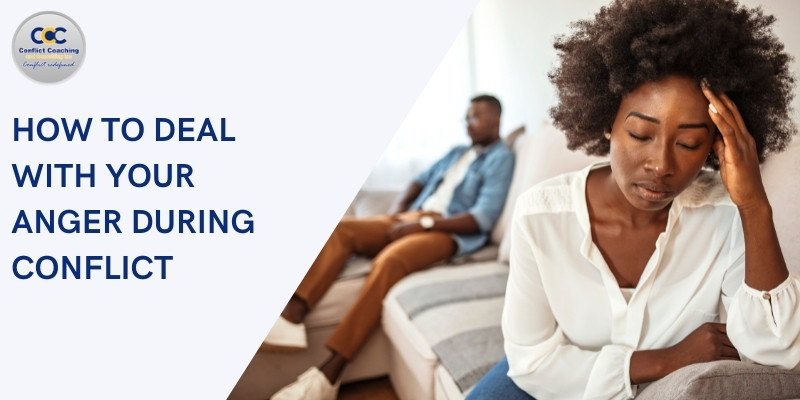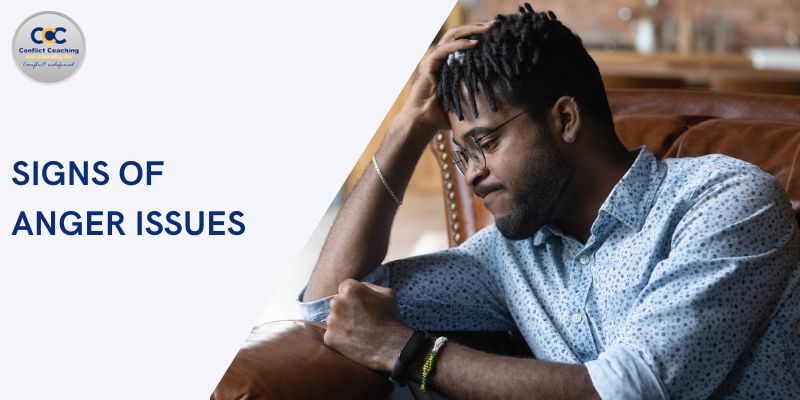
How To Deal With Your Anger During Conflict
Do you feel like your emotional reaction during conflicts is usually anger? Do you lash out when you have a disagreement with someone at home or at work? Does that come in the way of effectively solving the issue at hand?
Anger can be a healthy driving force and can give you the energy and motivation to come to a solution when you are faced with a problem. However, when this anger becomes too frequent, excessive and unjustified, it comes in the way of dealing with conflicts. It not only worsens the situation and hinders the search for a solution, but also harms your health and damages your relationship with those who you lash out on.
Conflicts are common and can arise at multiple times in your life, whether it is at work with your coworkers, with your friends, or at home with your spouse or children. What is important then, is that you learn to manage your anger during conflict so that you can stay calm and deal with that situation in a more logical manner.
Situations That Can Trigger Your Anger While Dealing With Conflict
During a disagreement, you can be faced with situations that push your buttons and trigger your anger to the point where you just lash out at the other people involved.
This creates an environment dominated by negative emotions and reduces your ability to think clearly. It may also throw off those that have witnessed your outrage and they may respond with anger too or refuse to engage with you at all.
If this happens, you will not be able to solve your issue effectively. Learning your triggers is therefore essential to settle the conflict without engaging in anger.
Here are some situations that can put you on edge and make you angry during a disagreement:
- If you are accused of doing something you were not involved in.
- If an insensitive comment or joke is made targeting you and your personal life.
- When you’re faced with the pressure of clearing up rumors or gossip that may have spread about you.
- Having to clean up another person’s mess when it wasn’t your fault that they got caught up in it in the first place.
- If the other person is not cooperating with you and is hard to deal with.
- If someone refuses to honor an agreement you had made with them.
- If someone threatens you or violates your personal space.
10 Most Common Physical Responses to Anger
Your body has a response to the angry emotions that you feel during a conflict. Being able to recognize these changes can allow you to keep yourself in check so that you can manage conflict without being angry.
Here are some ways of anger that your body may experience:
- Fast, shallow breaths
- Clenched jaw
- Muscle tension
- Increase in heartbeat
- Sweating
- Tightness in the chest
- Feeling hot
- Dizziness
- Trembling
- Pounding in the head
8 Steps to Manage Your Anger during Conflict
Here are some effective ways that you can resolve conflict without triggering your anger:
- Deep Breathing
- Walk Away and Take a Time-out
- Be a Good Listener
- Add Humor
- Eat Healthy and Get Sufficient Sleep
- Exercise Regularly
- Opt for Anger Management Classes
- Speak with a Therapist
1 – Deep Breathing
Deep breathing is one of the most effective ways to calm yourself down as soon as you start to feel extreme anger. It increases oxygen flow to your brain and relaxes your nerves, allowing your mind to clear and enabling you to think more logically. To achieve this, you can use any one of the breathing techniques that you know.
For example, if you are experiencing anger during a conflict, step away for a moment, close your eyes and inhale deeply. Imagine yourself smelling a flower. Hold your breath for a few moments, and then slowly exhale. As you do so, imagine that you are blowing out a candle. After a few deep breaths, you will realize that you feel much calmer.
2 – Walk Away/Take a Time-out
Another way in which you can cope with anger during a conflict is by walking away from the situation and allowing yourself some time to retrospect, self-reflect, and calm down. Walking away does not necessarily mean that you should physically move out of the space. In fact, it can also mean that you remain quiet or divert your mind towards something else.
When you sit with your anger for a while and allow your brain to process your emotions more logically, you may realize that there are other ways of dealing with the situation and that your anger was unnecessary. When you walk back into the conflict, you will look at things from a calmer perspective
3 – Be a Good Listener
Oftentimes, a reason for anger getting triggered during conflicts is because everyone wants to talk at the same time and nobody is patient enough to listen. This causes confusion and misunderstandings which worsens the situation.
It is necessary, therefore, that you develop the habit of being a better listener during conflicts. Remain patient, and listen to what the other side has to say. This will allow you to get a better perspective and will give you a deeper understanding of the issue. It might even clear up misconceptions that you may have had about the other person, which can then resolve the conflict.
You must realize that acting emotionally, impulsively, and aggressively will not help answer your problem. It is in fact when you give another person a chance to explain themselves and give their point of view that a cooperative, solution-seeking environment can be formed.
4 – Add Humor
Humor can go a long way in helping you control your anger during a conflict. You must learn the importance of maintaining a balance between taking things seriously and letting some things go. If you take even the smallest things to heart, you will always be on edge and your matter will not be resolved.
Try to be easy going when it comes to resolving conflicts. Feel free to add a few jokes here and there and if someone passes a comment, laugh it off if you can. This will create a lighter, more positive environment where problems can be solved together without the situation getting too heated.
5 – Eat Healthy and Get Sufficient Sleep
Eating a nutritious diet is an essential component in refreshing your mind and body and allowing you to deal with your problems positively. This is because both healthy food and sleep provide you with the energy that you need to recover from your exhaustion and go about your day with a logical, problem solving mindset.
When you sleep late or for a few hours and eat less or skip out on meals, your mind and body do not get the break that they need to revitalize. This puts you on edge and during a conflict, your instinct is to react with anger rather than looking at the situation calmly.
You must therefore, be more conscious of your diet and eat the right proportion of nutritious foods every day. You must also ensure that you get 6-8 hours of sleep daily.
6 – Exercise Regularly
Exercising regularly is an essential part of learning to deal with anger during conflict. This is because getting your body involved in physical exercise takes your mind off the angry or stressful thoughts that you may have and fills you with positive energy. This allows you to look at the problems that come your way with a clear and logical mindset.
Exercise releases happy hormones in your body such as endorphins which counter the anger and negativity within you. You feel more cheerful and are prepared to take on new challenges. This is essential in keeping you calm and composed during conflicts.
You can choose to exercise in any form that you like. You can join a club where you can play sports like tennis and swimming or you can even do yoga.
7 – Opt for Anger Management Classes
Another useful way for you to get better control of your anger is by enrolling in online anger management courses. These courses are not for counseling or therapy but are in fact specially designed to provide you with tips on how you can keep yourself in check.
You can follow the lessons at your own pace and enroll in any one of the courses ranging from a duration of 4-hour, 6-hour, 8-hour, 12-hour, 16-hour, 26-hour, 36-hour to 52-hour depending on the amount of assistance you feel like you need.
8 – Speak with a Therapist
If you feel like you are unable to control your anger by yourself you must not hesitate to take professional help and undergo therapy.
Psychotherapy is considered one of the most effective tools for dealing with your anger. Your therapist will help you treat your mental health by enabling you to understand yourself better. You will become more aware of what aspects of a conflict trigger your anger, how you react to these triggers, and how that impacts your wellbeing. This will in turn allow you to take preventive measures specific to yourself and keep your anger in check.
Just talking to your therapist about your issues can also help you overcome your anger because you have a safe place to disclose all your insecurities and let out all your frustration. This lightens the emotional weight you feel on your mind. Your therapist may even give you advice on how to approach a conflict without getting angry.
Your therapist may use one of several methods to help you out with your anger during a conflict including Cognitive Behavioral Therapy (CBT), humanistic therapy and psychoanalytic therapy.
Conclusion
Anger can be a major hindrance when it comes to resolving conflicts. There are many reasons that can cause you to become angry during disagreements such as a lack of cooperation from the other party or false accusations.
Lashing out, however, must be avoided as it creates a negative atmosphere and worsens the situation. It is therefore essential for you to learn how to deal with your anger during conflicts.
When you get angry during an argument, your body responds accordingly. Some of the physical symptoms of anger include sweating, headaches, increased heart rate, and muscle tension.
Once you recognize these symptoms, there are many ways that you can control your rage. In the short run, some effective tips to manage your anger are deep breathing and walking away. In the long run, therapy and online anger management can be beneficial.





Responses